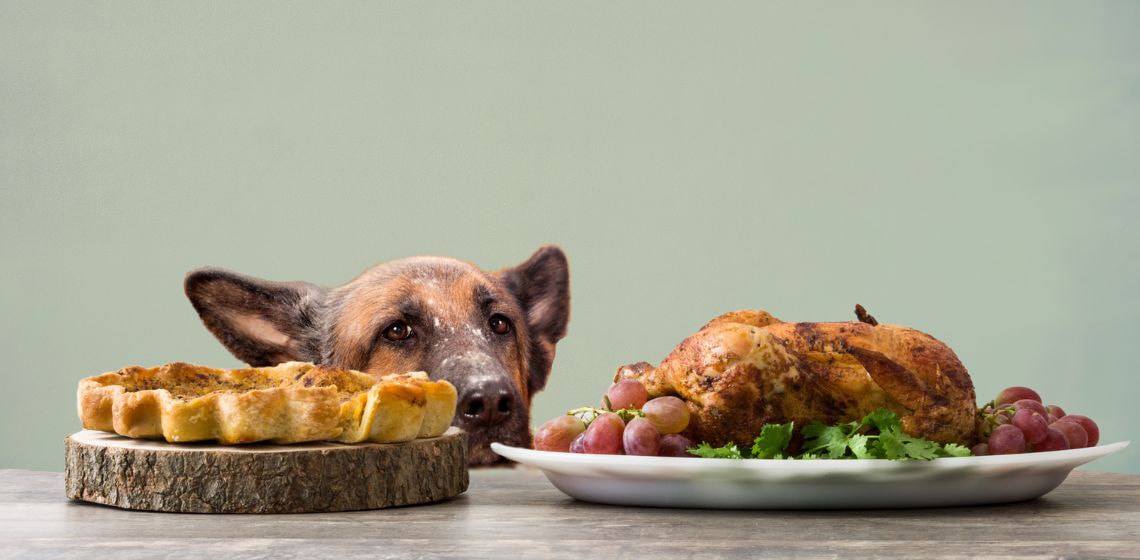Table of Contents
When enjoying the holidays it’s natural to want to include your furry friend in the celebration. However, as a veterinarian, I often get asked the important question: Can dogs eat turkey? In this article, we’ll explore the do’s and don’ts of sharing this Thanksgiving staple with your beloved pets.
The Basics of Canine Nutrition
Before diving into the specifics of whether dogs can safely consume turkey, it’s crucial to understand the basics of canine nutrition. Dogs have unique dietary requirements, and while they are omnivores, their nutritional needs differ from those of humans. A balanced and complete dog food provides the necessary nutrients to keep your pet healthy and happy. That said, occasional pet safe table foods are an enjoyable treat, but they should never replace a balanced diet for our canine companions.
Turkey and Dogs: The Good News
The good news is that plain, cooked turkey can be a safe and healthy treat for your dog. Turkey is an excellent source of lean protein, which is essential for muscle maintenance and overall canine health. It also contains vital nutrients such as zinc, phosphorus, and B vitamins that contribute to a well-rounded diet.
When offering turkey to your dog, make sure it’s plain and free from any added seasonings, herbs, or spices. Additionally, remove the skin, as it can be high in fat and difficult for dogs to digest leading to stomach upset. Small, boneless, and well-cooked portions are best to prevent any potential choking hazards or gastrointestinal issues. Never feed raw turkey as the meat can carry dangerous bacteria like Salmonella or Campylobacter.
The Dangers of Turkey Bones
While boneless turkey is generally safe for dogs, turkey bones pose a significant risk. Cooked bones, especially those that are brittle, can splinter easily. This can lead to serious complications such as choking, intestinal blockages, or punctures in the digestive tract creating a life threatening emergency. Never give your dog turkey bones, and be vigilant when disposing of them to ensure your pet can’t access them accidentally. Place them in the garbage outdoors where they are out of reach as many dogs love to get into the trash to seek out scraps.
Seasonings and Additives: A Cautionary Tale
The enticing aromas of Thanksgiving dishes often result from a combination of herbs, spices, and other seasonings. Unfortunately, many of these flavorings can be harmful to dogs. Onions, garlic, sage, and certain herbs commonly used in turkey seasoning contain compounds that can be toxic to pets, potentially causing gastrointestinal upset, anemia, or even more severe health issues.
Avoid sharing seasoned or marinated turkey with your dog, and opt for plain, unseasoned meat to ensure their safety. It’s also essential to be cautious of other Thanksgiving dishes that may contain ingredients harmful to dogs, such as onions, garlic, raisins, and chocolate.
The Impact of High-Fat Foods
While lean turkey meat is a healthy protein source, the same cannot be said for the skin, gravy, or drippings. These components are often high in fat, and a sudden influx of fatty foods can lead to pancreatitis in dogs—a painful and potentially life-threatening inflammation of the pancreas.
Pancreatitis symptoms include vomiting, diarrhea, abdominal pain, and lethargy. To avoid these complications, resist the urge to share fatty turkey trimmings with your pet. Stick to small, plain portions of well-cooked turkey to ensure a safe and enjoyable treat for your furry friend.
Thanksgiving Treat Alternatives
If you’re hesitant about sharing turkey with your dog or want to provide a safer alternative, consider preparing a special canine-friendly Thanksgiving treat. You can create homemade dog treats using dog-safe ingredients such as lean turkey, sweet potatoes, and carrots. Many pet stores also offer Thanksgiving-themed treats specifically designed for dogs, providing a festive and safe way to include them in the holiday celebrations.
Conclusion
In conclusion, while dogs can enjoy small portions of plain, cooked turkey as a special treat during Thanksgiving, it’s crucial to be mindful of potential hazards. Avoid giving your dog turkey bones, seasoned or marinated meat, and fatty trimmings to prevent digestive issues, choking, or other health complications.
As a responsible pet owner, prioritize your dog’s well-being by sticking to their regular, balanced diet and offering Thanksgiving treats in moderation. If you have any concerns about specific foods or your dog’s health, consult with your veterinarian for personalized advice. With a little caution and attention to your pet’s dietary needs, you can ensure a safe and joyful Thanksgiving for both you and your furry friend.

Dr. Paula Simons is an Emergency and Critical Care Veterinary Resident who aspires to be a veterinary criticalist. Dr. Simons is passionate about supporting pets and humans during their times of need. She has a special interest in critical care nutrition, trauma, and pain management. In her free time, she loves plant shopping, hiking, and traveling. She has volunteered in several different countries to help animals in need. She has two cats, Moo and Kal.








